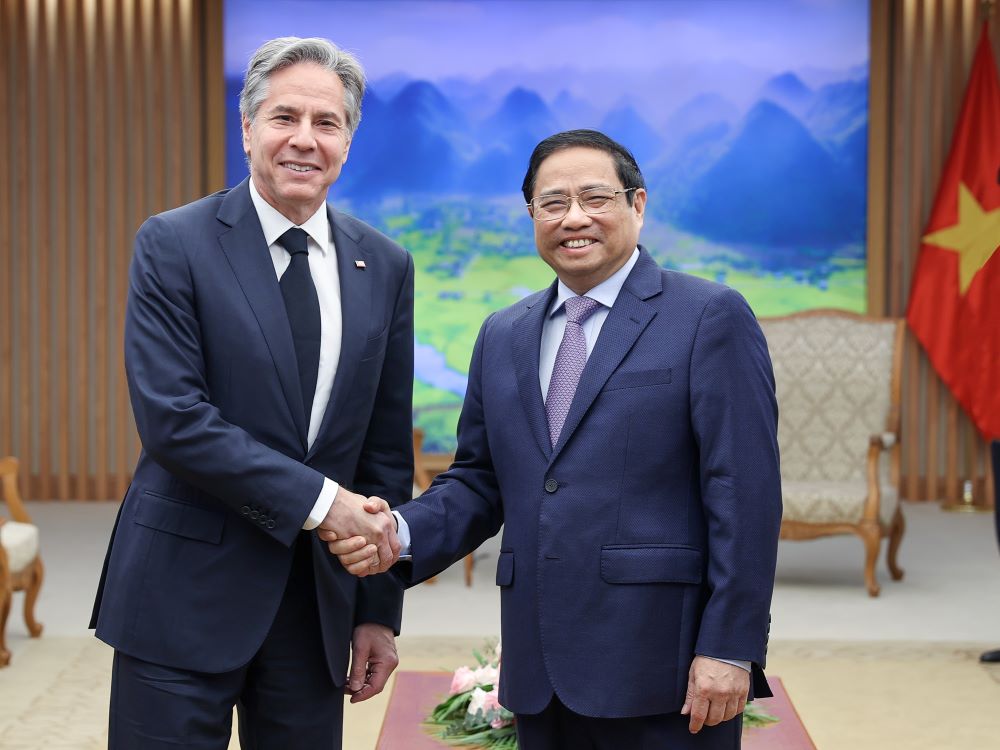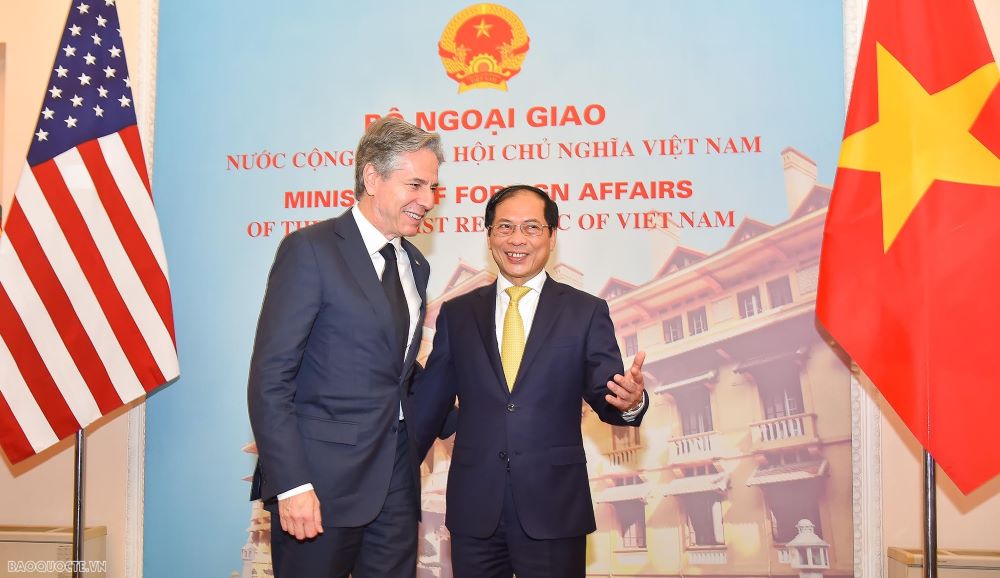Vietnam expects to lift relations with US
Vietnamese leaders talked about the prospect of a relationship that benefits not only the two countries but the Indo-Pacific region.
Vietnam considers the US one of its most important partners and wants to advance the Comprehensive Partnership.
| Vietnamese Prime Minister Pham Minh Chinh (R) and US Secretary of State Antony Blinken in Hanoi on April 15. Photo: VGP |
Vietnamese Prime Minister Pham Minh Chinh made remarks about the prospect of bilateral relations at the meeting with US Secretary of State Antony Blinken in Hanoi today [April 15].
Relations between the two countries are built and fostered based on the principle of respecting each nation’s independence, sovereignty, territorial integrity, and political regime, Chinh told Blinken, who is on a three-day visit to Vietnam starting on April 14.
The Vietnamese PM thanked the US Government for its Covid-19 vaccines, medical equipment, and assistance in other fields.
He called on the two sides to boost the exchange of high-ranking visits, support in addressing wartime legacies, and cooperation in key sectors, namely trade, science-technology, education, defense-security, and new fields, including digital economy, green transition, circular economy, innovation, climate change response, infrastructure, and production chain.
He requested that the US minimize the imposition of anti-dumping tariffs and unnecessary restrictions on Vietnam’s farm produce, woodwork, and cashew exports, which will leave an impact on local livelihoods.
PM Chinh expected the US Government to continue facilitating the community of 2.2 million Vietnamese Americans who bridge the relationship between the two nations.
On this occasion, Chinh highly appreciated the US's active role in maintaining peace, stability, and development in Asia, Indo-Pacific, and the world. He requested the US to continue the cooperation under the framework of the ASEAN-US Comprehensive Strategic Partnership and the Mekong-US Partnership to ensure security, safety, and freedom of navigation in the East Sea (referring to the South China Sea).
Apart from the meeting with PM Pham Minh Chinh, Blinken held talks with Foreign Minister Bui Thanh Son and Head of the CPV’s External Relations Commission Le Hoai Trung to discuss measures to strengthen the ties in foreign affairs and diplomacy.
Broader cooperation
In the meetings with Vietnamese leaders and at the press availability in Hanoi today, Blinken said the two nations have forged a relationship that’s “robust, dynamic, and consequential.”
He reiterated that his visit would focus on how the US can continue supporting Vietnam’s success in a broad range of shared interests, including cooperation on the climate crisis and preventing pandemics. “I also focused on how our countries can advance a free and open Indo-Pacific, which is at peace and grounded in respect for the rules-based international order. When we talk about “free and open,” we mean that countries are free to choose their own path and their own partners.”
In his meetings with Vietnamese leaders, Blinken shared that he discussed US work to promote broad-based prosperity in Vietnam and throughout the region, including through the Indo-Pacific Economic Framework (IPEF).
He said Vietnam had joined negotiations on all four pillars of IPEF. This will help lead a race to the top on the issues shaping the 21st-century economy, including supply chain resilience, the clean energy transition, and digital connectivity.
Fields of the discussions also include respect for ASEAN centrality and close partnership through regional economic frameworks, including APEC and the Mekong-US Partnership.
Regarding the bilateral economic partnership, he said the US is helping Vietnam double down on key reforms it’s embraced – including on labor, intellectual property, and fair trade and building resilience to adapt to a changing climate and energy transition.
| Vietnamese Foreign Minister Bui Thanh Son and Antony Blinken on April 15. Photo: Baoquocte |
Specific sectors
On energy transition, the two countries are collaborating on new bilateral climate initiatives announced by Vice President Harris during her visit to Vietnam in August 2021, which covers conserving ecosystems, reducing emissions from rice farming in the Mekong Delta, expanding a market-driven clean energy system, scaling up the adoption of electric vehicles, and leveraging private sectors to drive climate action.
Blinken said the US is harnessing regional frameworks like the Just Energy Transition Partnership that Vietnam recently joined, which will deploy US$15.5 billion to help Vietnam deliver on its ambitious net-zero 2050 goal, and the Japan-US-Mekong Power Partnership.
Meanwhile, the US is working to build up Vietnam’s public health capacity, including establishing a National Center for Disease Control (CDC). The US has supported Vietnam in combating the Covid-19 pandemic by donating more than 40 million vaccine doses, following Vietnam’s donation of millions of articles of PPE during the early part of the pandemic, when America was at its time of greatest need.
Concerning the regional issues, the talks in Hanoi today also focused on how the two sides can advance a free and open Indo-Pacific. The two countries have common interests in respecting international law, unimpeded commerce, and freedom of navigation and overflight.
Blinken revealed that the US is finalizing the transfer of a third US Coast Guard cutter to Vietnam, complementing a fleet of 24 patrol boats and other equipment, training, and operational facilities they have provided since 2016 to bolster Vietnam’s capacity to contribute to maritime peace and stability in the South China Sea.
On this occasion, Blinken affirmed that the US respects Vietnam’s right to shape its future under its political system and is committed to ongoing work to address the legacies of the war, including clearing unexploded ordnance, cleaning up dioxin hotspots, and accounting for those missing from the war.
“I have to say it’s a very powerful example of countries coming together and coming to each other for assistance when each of us needs it the most,” Blinken noted.













